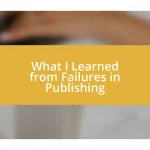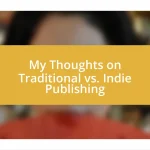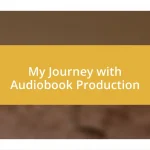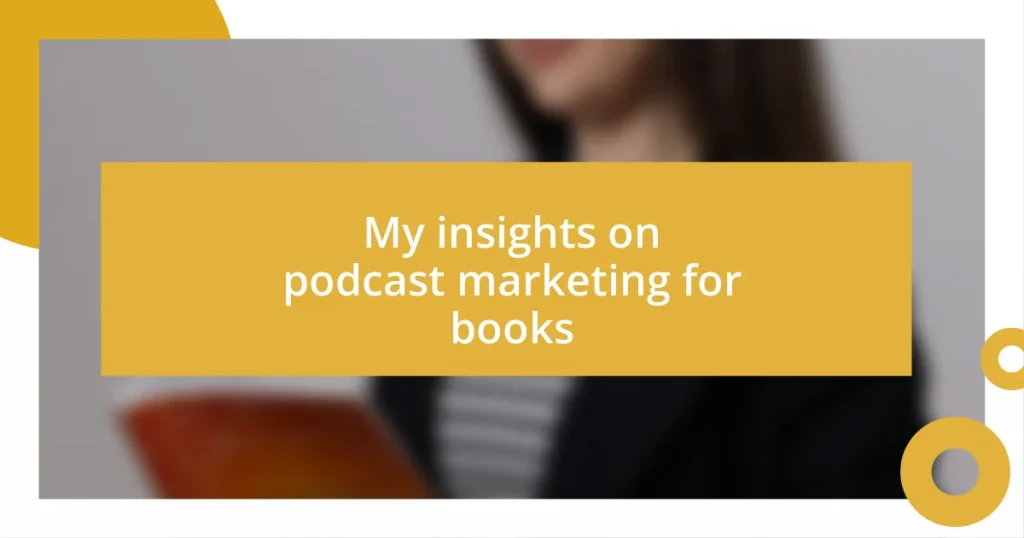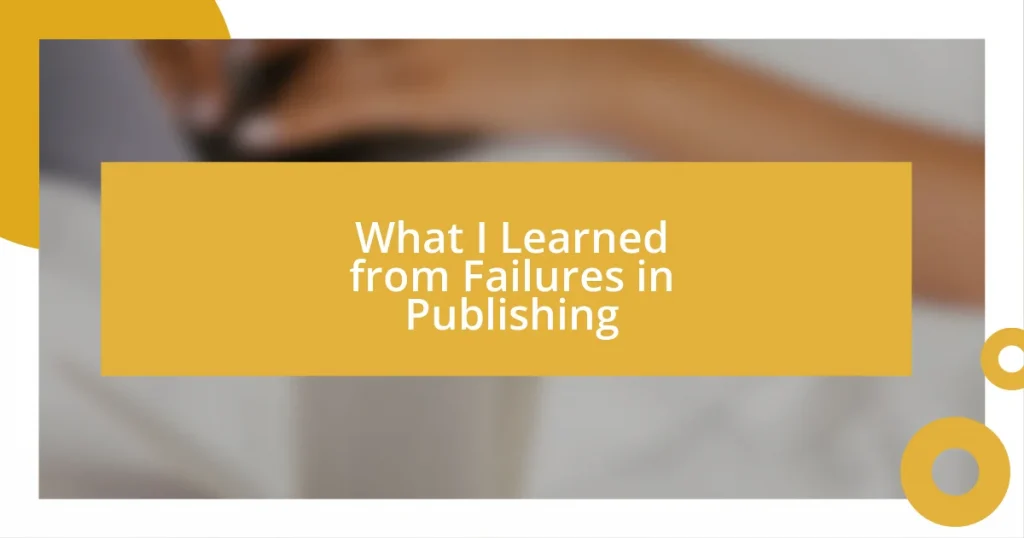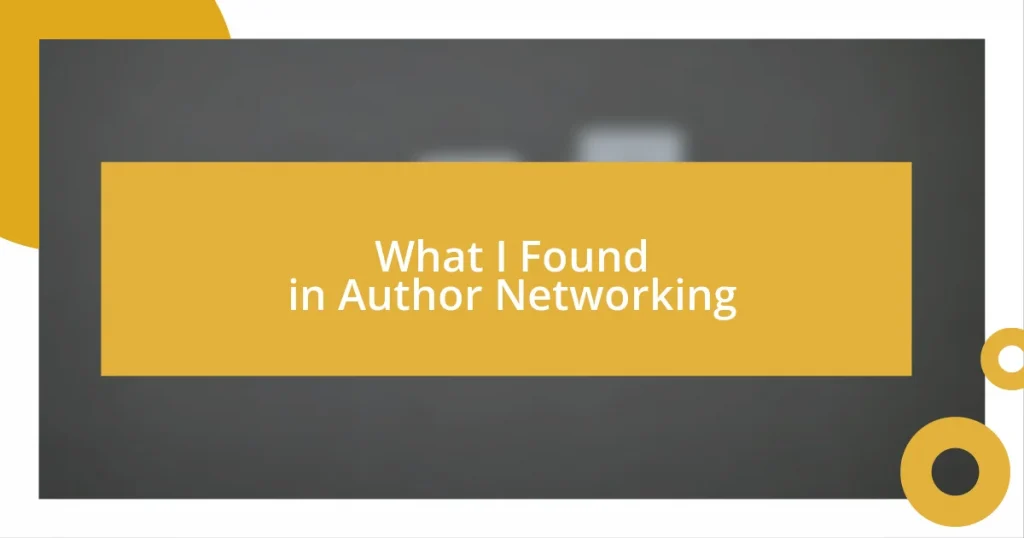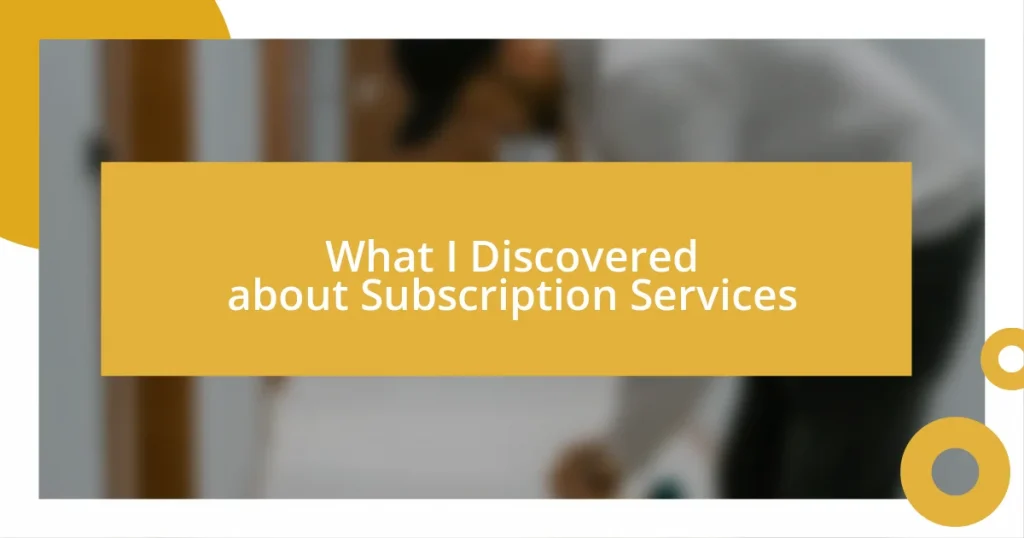Key takeaways:
- Podcast marketing fosters an intimate connection with audiences, allowing authors to share their stories and resonate deeply with listeners.
- Engaging content creation through personal anecdotes, interactive segments, and diverse formats significantly enhances listener engagement.
- Collaborating with podcast hosts and analyzing feedback helps authors expand their reach, refine their content, and strengthen relationships for future opportunities.
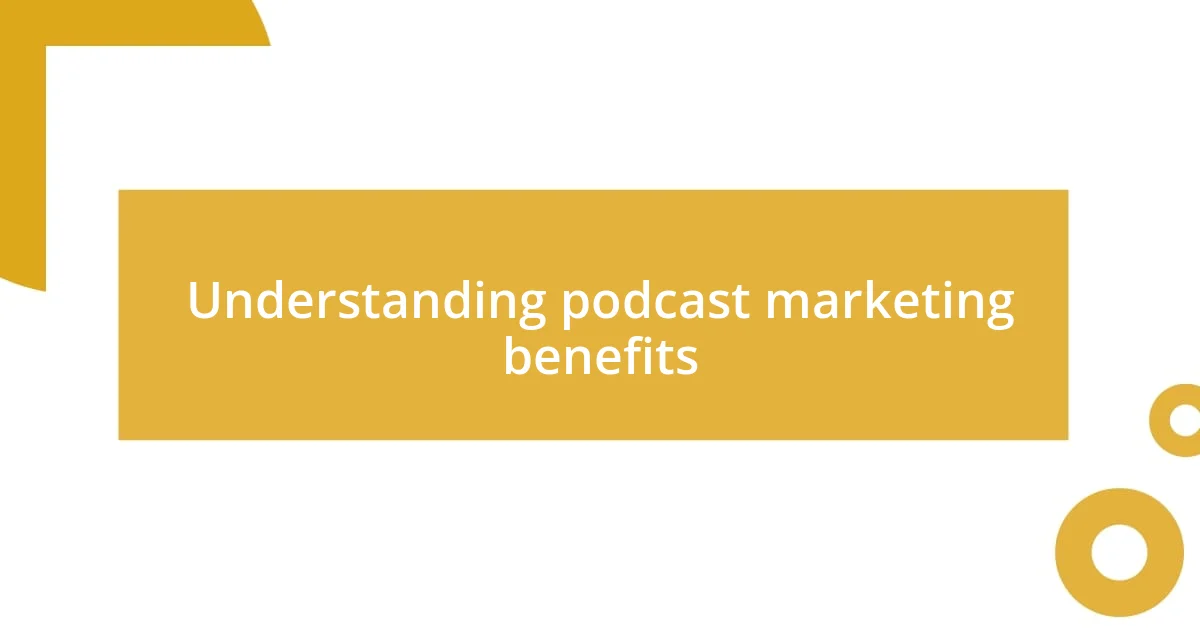
Understanding podcast marketing benefits
Podcast marketing offers unique advantages for authors looking to reach broader audiences. From my experience, one of the biggest benefits is the intimate connection podcasts create. You’re not just promoting a book; you’re sharing stories and ideas that resonate with listeners, making them more likely to engage with your work. Have you ever felt that immediate bond with a speaker, as if they’re sharing secrets directly with you? That’s the power of audio.
Moreover, the niche nature of many podcasts allows authors to tap into highly targeted audiences. I recall promoting my book on a podcast that focused specifically on the genre I was writing in. The host’s passionate community came to life in the chat, and the feedback was incredibly positive. It was rewarding to see listeners connect with the themes I raised, knowing that they were genuinely interested in what I had to offer. How often do you get such focused attention in other marketing channels?
Finally, the longevity of podcasts means that your message can continue to reach new listeners over time. I’ve seen episodes remain relevant long after their release, which is a comforting thought. Every time a new listener discovers an episode that features my book, it’s like opening a fresh chapter in an ongoing conversation. Isn’t it exciting to think about the lasting impact your words can have?
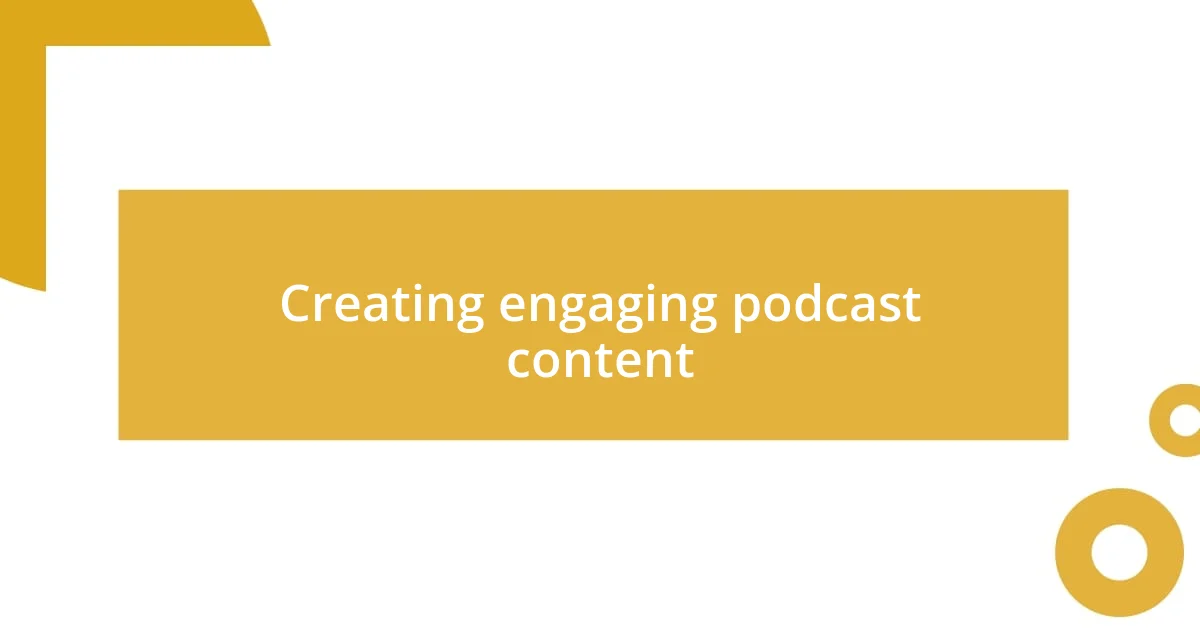
Creating engaging podcast content
Creating captivating content for a podcast can be a game changer for authors. From my experience, knowing your audience is key. I remember crafting an episode where I dove deep into my writing process, sharing not just the wins but also the struggles. This honest approach resonated with listeners who saw a bit of themselves in my story. Have you ever talked to a friend and realized your challenges were similar? That connection can make your content truly engaging.
In addition to personal stories, incorporating interactive elements can significantly boost engagement. I once did a live Q&A segment where listeners sent in questions about the themes of my book. The energy in those moments was electric; I felt like I was on stage addressing an enthusiastic crowd. It’s a reminder that involving your audience turns a monologue into a dialogue.
Furthermore, varying content formats keeps your listeners on their toes. Whether it’s interviews, storytelling, or discussions, diversity can spark interest. I’ve collaborated with various guests, each adding their unique touch to the episodes. This not only enriched the content but also introduced me to their followers, expanding my own audience. It’s like throwing a party and inviting all your interesting friends—everyone enjoys mingling and sharing stories.
| Content Element | Engagement Impact |
|---|---|
| Personal Anecdotes | Builds a relatable connection with the audience |
| Interactive Segments | Encourages listener participation and investment |
| Diverse Formats | Keeps the content fresh and appealing |
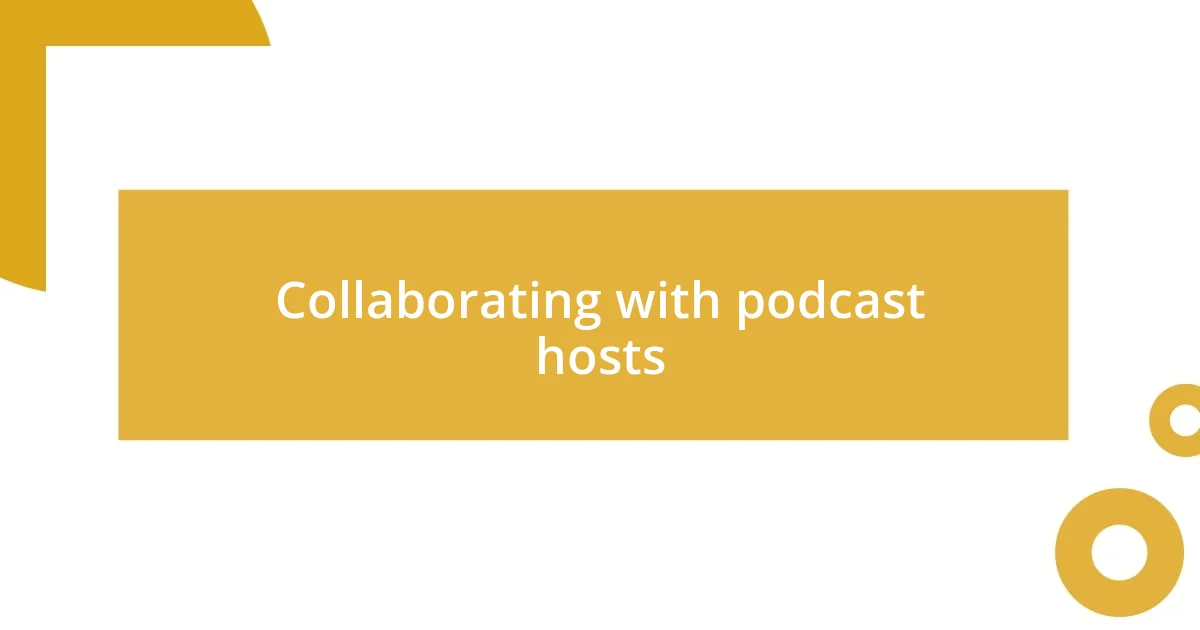
Collaborating with podcast hosts
Collaborating with podcast hosts has proven to be one of the most effective strategies for promoting books. I remember when I was a guest on a well-respected podcast, and the host genuinely encouraged me to explore the deeper themes of my book. The conversation flowed naturally, and it felt less like an interview and more like a heartfelt discussion among friends. This connection not only showcased my work more authentically but also allowed listeners to see the passion behind my writing.
Building a strong relationship with podcast hosts can amplify your reach tremendously. Here are some strategies to consider:
- Personal Connections: Take time to engage with the host’s content beforehand, sharing genuine feedback or insights. This shows investment in their work, fostering a stronger connection.
- Offer Value: Think about what you can bring to the table. Whether it’s expertise related to your book or discussing trends in your genre, offer something that benefits the host and their audience.
- Follow Up: After your appearance, reach out to thank the host and share your thoughts on the episode. This not only leaves a positive impression but also paves the way for future collaborations.
By fostering a collaborative spirit, both authors and podcast hosts can create an enriching experience that resonates well with listeners.
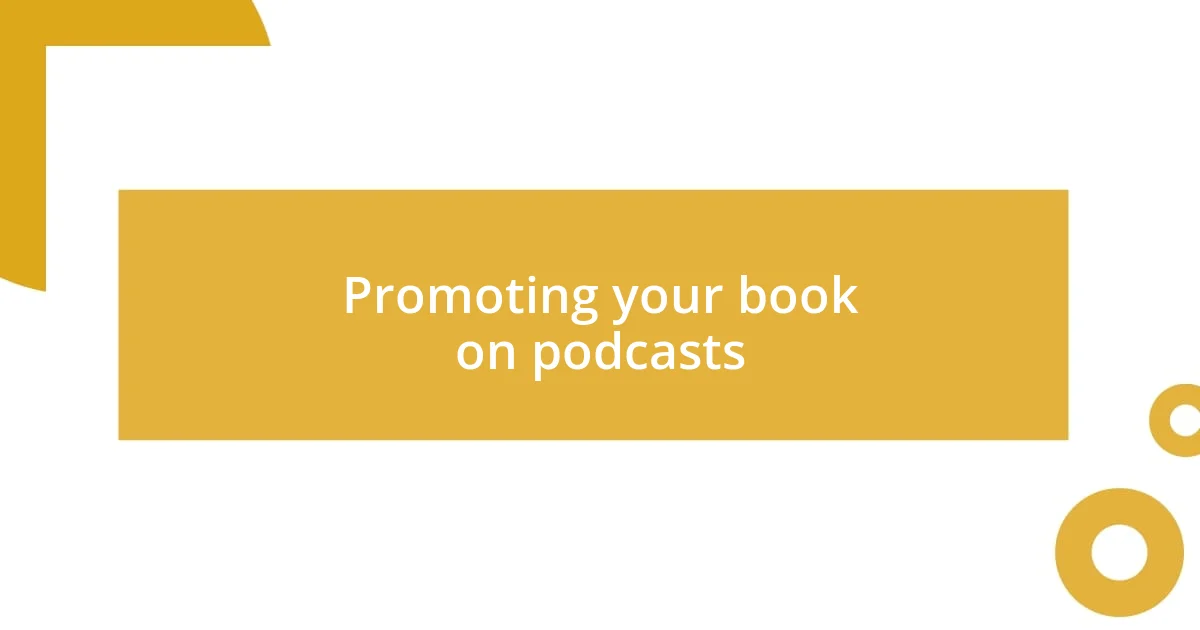
Promoting your book on podcasts
Promoting your book on podcasts can be a transformative experience. I vividly recall my first time appearing on a podcast dedicated to my genre. The host asked me unexpected questions that prompted me to share behind-the-scenes stories from my writing journey. Witnessing the genuine enthusiasm from the listeners flooded me with a thrill—it’s an incredibly rewarding feeling when your passion is met with interest.
To effectively promote your book, consider tailoring your pitch to the podcast’s audience. I once pitched a specific angle to a host about the mental health themes in my novel. By aligning my content with their audience’s interests, I captured not just the host’s attention but also those of their dedicated listeners. Imagine stepping onto a stage where everyone is eagerly waiting to hear your story; that’s the power of being relatable.
Additionally, engaging actively with the podcast community after your episode is crucial. I often share snippets of my appearances on social media and even send thank-you notes to hosts. It’s not just polite; it builds lasting relationships that can lead to more opportunities. How often do we find ourselves swept up in the rush, forgetting to appreciate those who help shape our journey? A simple gesture can keep the conversation alive and the interest in your book thriving.
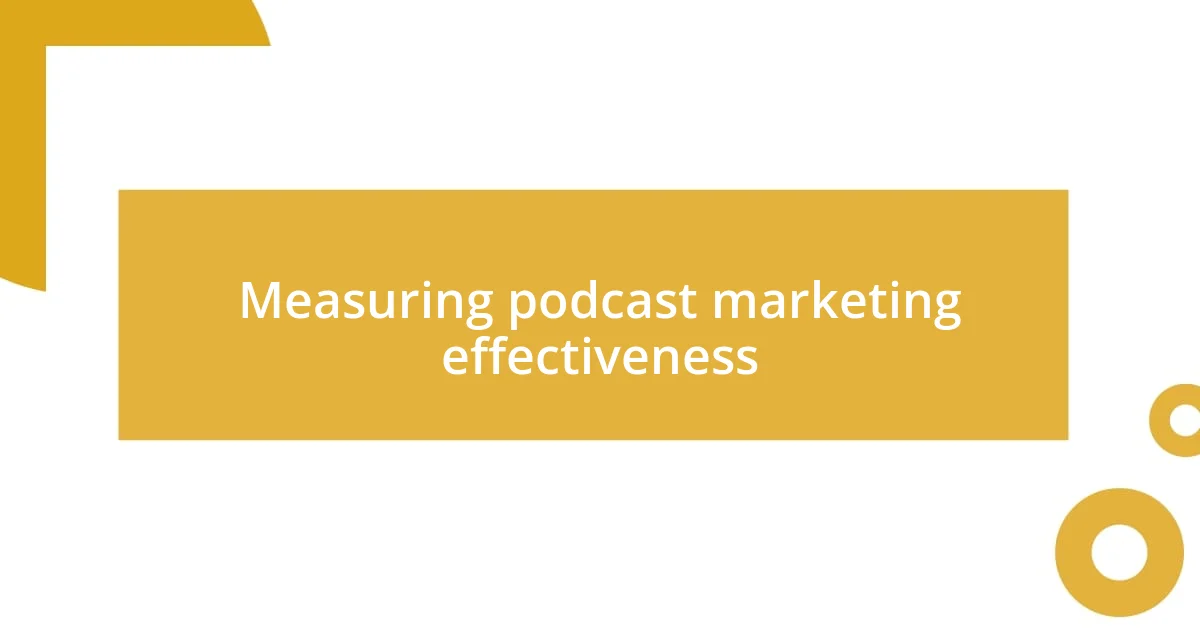
Measuring podcast marketing effectiveness
Measuring the effectiveness of podcast marketing for books can initially seem daunting, but it ultimately boils down to understanding specific metrics. I remember the thrill of seeing a significant spike in downloads following my podcast appearance. It was fascinating to correlate those numbers with the discussion topics we covered, reinforcing the idea that the right storytelling could have a measurable impact. Have you ever watched your metrics soar after a captivating interview? It’s a real affirmation of your efforts.
Beyond downloads, listener engagement plays a crucial role in evaluating success. I often find myself checking social media interactions, emails, and even direct messages from listeners who share their thoughts about my books after hearing me on a podcast. Each comment feels like a window into the audience’s mind, revealing what resonated with them. Engaging with this feedback not only helps gauge effectiveness but also allows for deeper connections with potential readers. Have you considered how your listeners’ responses reflect the depth of your message?
Lastly, don’t forget to track conversion rates, as they can truly illuminate the impact of your podcast efforts. I once created a custom discount code exclusively for a podcast audience, and the results were eye-opening. The numbers showed a direct relationship between the episode and the purchases made, validating the potential of podcast marketing as a powerful promotional tool. This experience taught me that each strategy you implement can be fine-tuned through careful measurement and analysis, leading to even more effective outreach in the future. What strategies have you found that directly influenced your book’s sales?
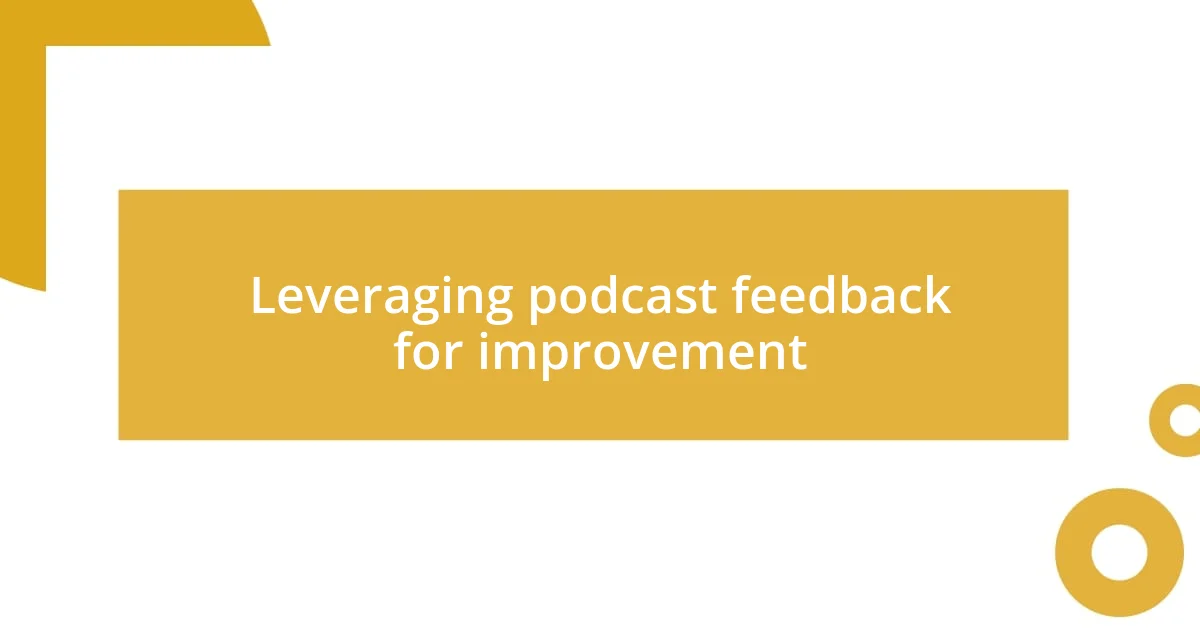
Leveraging podcast feedback for improvement
When it comes to leveraging podcast feedback for improvement, I find that listening to audience reactions can be a treasure trove of insights. After a recent episode, I noticed several listeners shared their thoughts on social media about my book’s pacing. It was eye-opening! Feedback like that offers a chance to revisit and refine not just the content but also my narrative style. How often do we overlook what our audience is saying, thinking we already know what works?
Engaging with listener feedback can also create a community of passionate readers. In one instance, a listener reached out after an episode to suggest themes I hadn’t considered. At first, I was unsure about their perspective, but I decided to explore that idea further. The result? A subsequent chapter in my next book turned out to be one of my favorites! It’s astonishing how one piece of feedback can spark creativity. Have you ever taken a risk based on listener insight?
Moreover, embracing constructive criticism can be daunting but immensely rewarding. I once received a rather blunt critique about my delivery during a podcast—an eye-opener for sure! Initially, I felt defensive, but then I took a step back and realized it highlighted an area for growth. That prompted me to practice my delivery more intentionally, and the next time I spoke on air, I felt more confident and engaging than ever. Think about it: how could we turn challenges into stepping stones for improvement?
